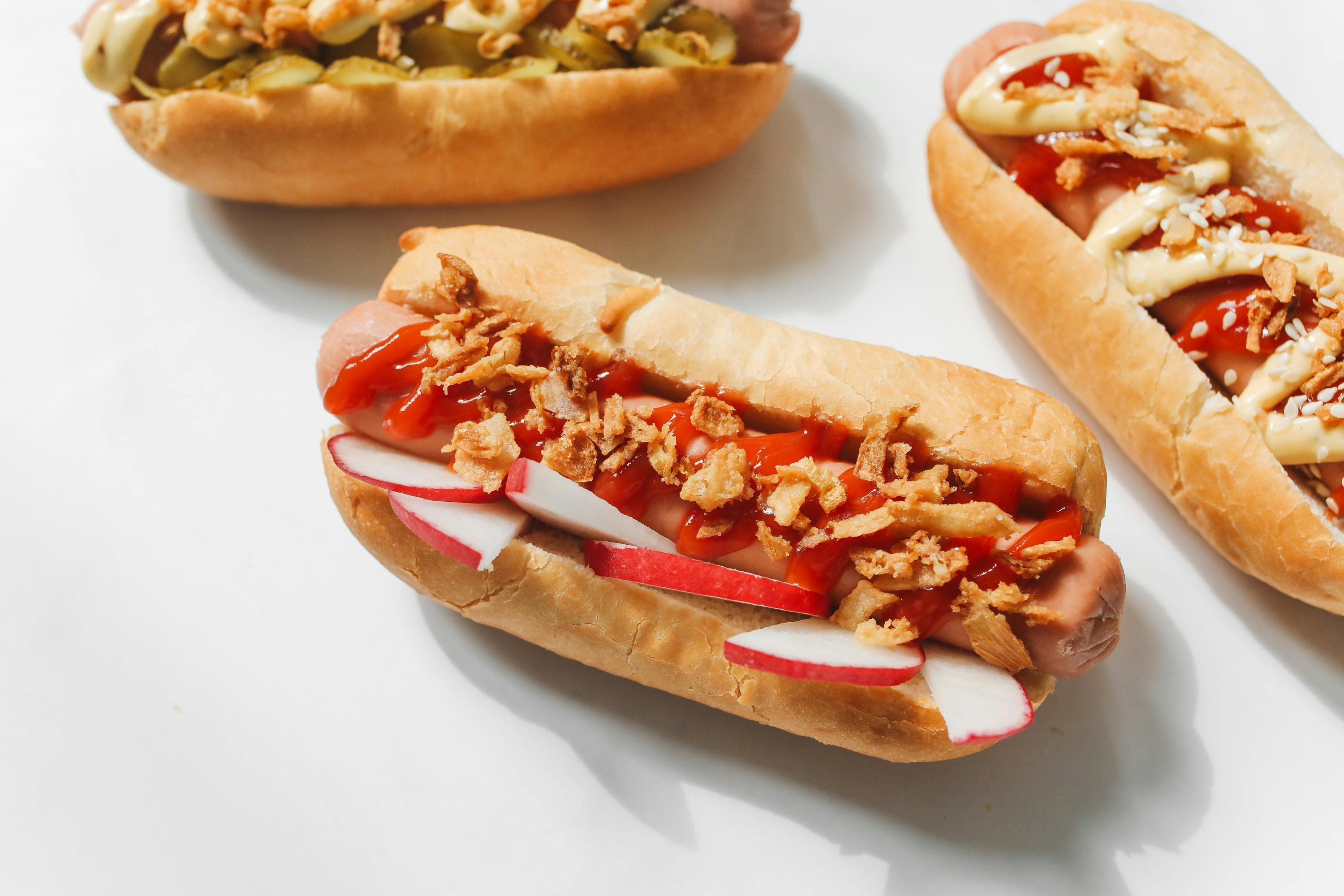Coffee consumption in the UK - Appinio Study
Survey Experts · 23.11.2021 · 20min read
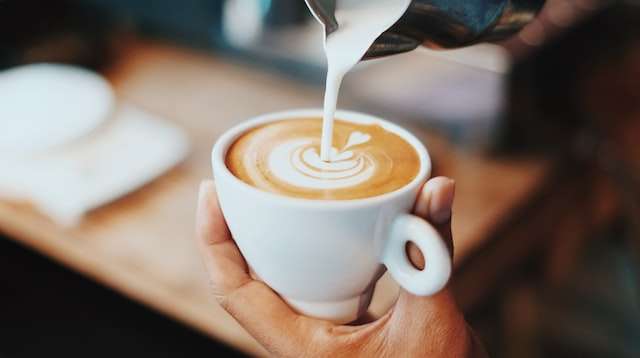
Content
Because nothing gets done without coffee, not even this blog post
Poured down in a rush at breakfast or as a pick-me-up before getting back to work, drinking it black or up with “sugar, spice and everything nice”, coffee has become an integral part of our lives and it is undoubtedly one of the most popular drinks of our times.
September and October have been great months for all coffee drinkers in the UK - London was home to the London Coffee Festival (23-26 Sept, 2021), the 1st of October was International Coffee Day, afterwards the UK Coffee week came about (18-24 Oct, 2021) and to wrap it up nicely, the Global Coffee Festival took place (online) from the 29th to the 31st of October, 2021.
In honor of the caffeinated drink, coffee newbies, coffee lovers, coffee snobs, coffee experts and connoisseurs have rejoiced to answer the most burning questions around the black gold.
Check out the new Appinio coffee study, for interesting stats and the hottest insights.
💡 Want caffeinated insights at a glance? Download the beautiful infographic for free!
First things first: Where does coffee originate from?
Coffee has a very interesting story and, like every interesting story, it involves the magic of serendipity. Coffee’s story starts in Ethiopia, allegedly back in 850 AD, where rumor has it, animals feeding on these bright red berries suddenly experienced an explosion of vitality.
It travels to the Middle East, makes a U-turn towards the Balkans and Italy and then spreads throughout Europe, where it gives life to the coffee house culture thanks to Jerzy Franciszek Kulczycki, a Polish military officer that opened the first coffeehouse in Vienna. The delicacy became indispensable to European officers that brought it along in their travels to their colonies and started coffee cultivation, and that’s how coffee landed in Asia & South America.
Previously used to perform ancient rituals to appease the Gods, coffee has been more recently enjoyed for its other divine properties: boosting energy levels & concentration (especially during Zoom meetings), bursting with antioxidants & helpful in contrasting the insurgence of cardiovascular diseases and diabetes (in moderate quantities, of course).
What makes coffee so special?
Drinking coffee is something so embedded in modern society that “Let’s meet for a cup of coffee” does not describe the act of actually drinking a cup of java, but it entails a social component: “I want to get to know you better” or “I want to bond with you”.
Furthermore, coffee takes many forms and shapes. Long gone are the days of the Moka pot on the stove. Today we can taste coffee brewed with Aeropress, French Press, percolators and tools that belong to scientific labs (e.g. the refractometer), coffee punched out of aluminum capsules or sifted through drip bags, there are even coffee gels!
Of course not all coffee drinkers are created equal. Some coffee drinkers go the extra mile to quench their thirst for coffee & knowledge, that is why Appinio has decided to conduct a comprehensive study targeting two different groups: general population & coffee lovers, in order to gather data on coffee habits and behaviour at home and outside of home & to understand what British coffee drinkers & British coffee lovers have in common and where there are significant differences.
Appinio's research: the study on coffee
Two surveys have been created and carried out and their respective results have been compared.
The first survey was run with a representative sample of the UK population according to age, gender and location, in order to provide an overview on Brits’ coffee habits & behaviours.
The second survey instead was targeted at people that met the specific criteria of coffee lovers, namely drinking coffee on a daily basis, regularly brewing coffee at home; using a variety of coffee formats at home, not solely instant coffee; and ultimately, keeping up with coffee trends.
Both surveys were almost identical, but the one aimed at the coffee lovers included a couple of “advanced questions” in order to gather more information on specific dimensions, e.g. loyalty to one specific coffee format, coffee brewing method or coffee shops, sources of coffee knowledge & use of professional tools.
General behaviour and coffee consumption in the UK
On a typical day, Brits drink around 2-3 cups of coffee per day with most of the consumption taking place at home.
Coffee lovers do not differ that much as they drink 3 full cups of coffee per day.
For both the general population and coffee lovers, the preferred coffee roasting level is medium (GenPop 52% vs. Coffee lovers 60%) and the most popular coffee concoctions usually include regular milk, as well as sugar.
Alternative milks are also gaining ground (GenPop 15% vs. Coffee lovers 24%), oat milk being the most popular, followed by almond milk, soy and coconut milk in this order.
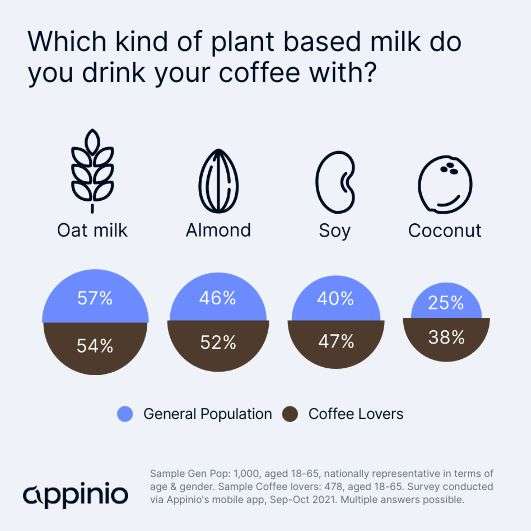
Coffee preparation at home & coffee spending
Opening Brits’ kitchen cupboards, we should not be surprised to find instant coffee & ground coffe within a hand’s reach.
But a coffee lover cupboard may look slightly different. Here we are more likely to find:
- coffee beans (GenPop 14% vs. Coffee lovers 33%),
- espresso capsules (GenPop 14% vs. Coffee lovers 31%),
- filter capsules (GenPop 12% vs. Coffee lovers 25%)
- and E.S.E. pods as well (GenPop 13% vs. Coffee lovers 23%).
Even if coffee lovers have a more diverse cupboard, there is no beating around the bush: the UK is an instant coffee nation and 73% of Brits in our general survey stated that instant coffee is their go-to when it comes to brewing coffee at home. Not even coffee lovers are immune to the instant coffee charm, but definitely to a lesser degree.
Other popular brewing methods at home for both groups are:
- the coffee pod machine (GenPop 24% vs. Coffee lovers 39%),
- coffee capsule machine (GenPop 23% vs. Coffee lovers 33%)
- the espresso machine (GenPop 19% vs. Coffee lovers 29%).
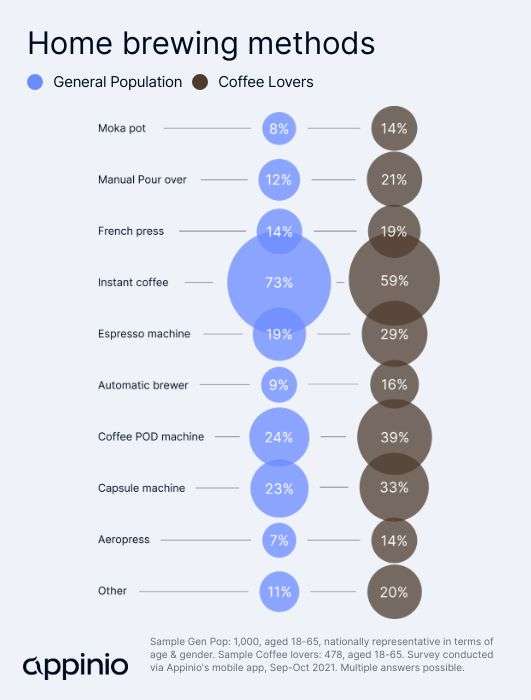
Our surveys reveal that Brits use a variety of different methods when it comes to making a cup of Joe at home and it is no surprise that coffee drinkers also have different tools to support the brewing process.
The humble kettle brings together the general population and coffee lovers as the most used tool when brewing coffee at home (at respectively 73% & 46%). However, this is only an exception and the two groups differ in what and how many tools are under their belt for an optimal coffee preparation. This is inevitable when thinking back to the fact that the general population drinks mostly instant coffee and therefore, they do not need a wide array of utensils.
On the other hand, coffee lovers are more likely to own a multitude of instruments, like the indispensable coffee grinder (29%), coffee filters (26%), and milk frother (25%) and they are more likely to own coffee scales, coffee tampers, distribution tools and gooseneck kettles.
The preference of both groups for instant coffee, coffee pods and capsules seem to highlight the wish of a consistent coffee experience in time. Considering only pods & capsules, consumers seem to covet the same high quality output without too much effort.
Naturally, this leads to differences in monthly spending for coffee to brew at home.
The general population spend a monthly average of £16, while the coffee lovers spend £25, confirming that the general population relies heavily on the cheap instant coffee, while coffee lovers’ coffee baskets contain higher priced coffee items (e.g. specialty coffee beans, coffee capsules, coffee pods).
However, in both groups men usually spend more than women, younger respondents, like Gen Z & Millennials, spend more than older ones and Londoners spend more than the rest of the UK.
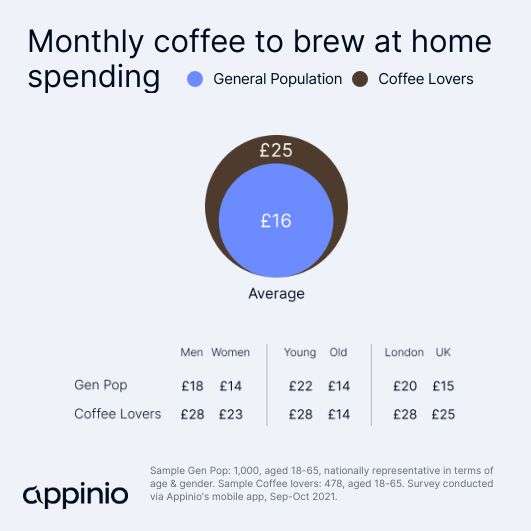
Coffee consumption outside of home & coffee spending
The beauty of coffee is that it’s a great treat to enjoy outside of the home, with friends and family, with your date or just to kill time in between errands.
The UK is home to the most successful coffee chains and Brits shower them with love. Our results confirm that high street coffee shops are the stronghold of coffee to-go for both the general population and coffee lovers (for the latter ones to a slightly lesser extent).
What do Brits order at coffee shops?
In our research, we tested 20 different types of coffee drinks and we asked Brits how often they would drink them when at a coffee shop.
Here are the coffee drinks that we tested:
- Ristretto
- Espresso
- Lungo
- Americano
- Long Black
- Macchiato
- Flat white
- Cortado, Piccolo, Gibraltar
- Cappuccino & Caffe Latte
- Corretto (espresso with alcohol)
- Mocha (espresso with chocolate)
- Romano (espresso with lemon)
- Caramel macchiato
- Filter coffee
- Cold filter coffee & cold brew
- Iced or blended (e.g. Frappuccino)
The undisputed winner of all coffee drinkers’ hearts is Cappuccino.
For both the general population and coffee lovers, Cappuccino is the favoured choice (GenPop 82% vs. Coffee lovers 91%). However, the Cappuccino is the exception, as the general population and coffee lovers have diverging opinions about the rest of the menu. The general population seems to favour milk based coffee drinks like Cappuccino (82%) and the Flat White (70%). Filter coffee (68%) and the classic Americano (64%) rank in third and fourth place.
In comparison, coffee lovers seem to have made an exception for Cappuccino (91%), as other most favoured drinks are Filter coffee (85%), Americano (79%) and Flat white (77%), closely followed by Espresso (75%), only in seventh place for general popularity.
What about the less popular coffee drinks?
The board is unanimous:
- Lungo (GenPop 24% vs. Coffee lovers 37%)
- Corretto (GenPop 22% vs. Coffee lovers 38%)
- Ristretto (GenPop 22% vs. Coffee lovers 33%)
- Romano (GenPop 18% vs. Coffee lovers 26%)
Even if these are the most niche coffee drinks, we can still observe that coffee lovers are more likely than the general population to enjoy them at the coffee shop. Real passion or just a show of strength?
Differences between the general population and coffee lovers in regards to coffee to-go spending are not that big, coffee lovers spend only £1 more than the general population ( £5 vs. £4), and we could observe the same trend in both groups, men tend to spend more than women and younger segments, like Gen Z and Millennials, tend to spend more than older ones.
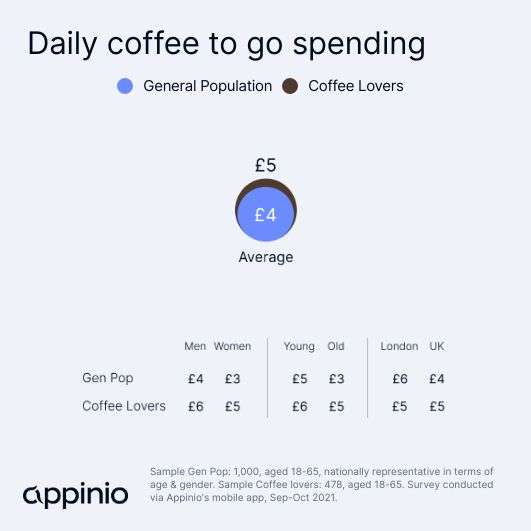
Further details on coffee lovers
Whether they’re just following trends or trying to become a professional barista, our sample shows different sides of the coffee lovers.
For starters, these people are always on the lookout for something new to try, despite having favourite coffee type and/or methods, they are always hungry for more (62%) and they actively seek inspiration, mostly in their inner circle of family & friends (57%), but also reaching out to experts like their trusted barista(s).
They also engage in coffee talks online, 22% of them say that they look for inspiration on online communities and forums, like Reddit (the subreddit r/coffee counts 770.000 members!). Furthermore, coffee lovers seem to fall more easily into temptation. In the past six months, coffee lovers were more likely to have bought something to add to their coffee set-up than the general population.
Final thoughts on british Coffee consumption
In conclusion, there seems to be quite a lot of people among the general population and the coffee lovers that are keen to get great, consistent coffee if we look at the ever growing popularity of coffee pod & coffee capsule machines.
Only a small percentage (4%) is willing to invest the time & effort it takes to make this a craft (among our respondents, the percentage of people that considers coffee a hobby is very low, 3% for the general population and 4% for coffee lovers).
So there is definitely a good opportunity for coffee players to serve a bigger slice of Brits by offering solutions that are easy and quick, but guarantee a high quality coffee.
The size of the opportunity for the plethora of companies serving the people that consider coffee a hobby (we can call them coffee geeks) is smaller, but these guys potentially spend a lot more as they experiment with different coffee formats & brewing methods, buy a lot of tools & accessories for their home coffee set-ups & keep up to date signing up for coffee courses.

I need to be all caught up with industry trends but also with consumer trends. The Appinio research on coffee confirmed many of the trends I have been observing for years now, but it also unveiled new consumer behaviour that surprised me and made me think about how to tackle the challenges ahead
Maxwell Colonna is the current UK Barista Champion, three-time world finalist & the proprietor of Colonna & Smalls, a Bath-based business internationally renowned for the quality of its coffee.
Interested in running your own study?
Get facts and figures 🧠
Want to see more data insights? Our reports are just the right thing for you!

